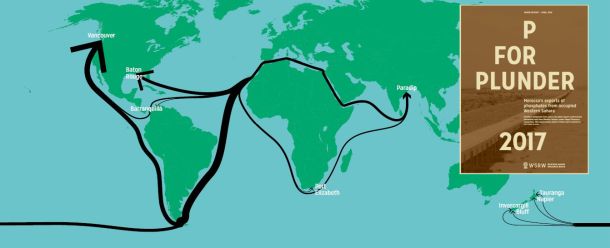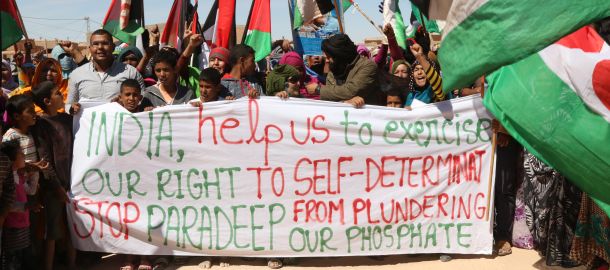
GE Vernova, Siemens Energy and Larsen & Toubro are among the multinationals that have reportedly expressed interest to aid Morocco transport energy generated in occupied Western Sahara to Morocco proper.
Morocco’s National Office for Electricity (ONEE) has named five big multinationals as having submitted their candidacy for the 3 GW power line project that will transport energy generated in occupied Western Sahara to Morocco proper. That is reported by Moroccan media, which lists the following companies as being part of ONEE's announcement: GE Vernova (USA), Siemens Energy (Germany), Power China Sepco1 (China), TBEA (China) and Larsen & Toubro (India).
ONEE circulated the names after having opened the application files for the Engineering, Procurement and Construction (EPC) of the so-called 'Electric Highway', a tender that was open to applicants until 12 November 2024. At that time, the deadline had been postponed 6 times this year, as reported by Western Sahara Resource Watch (WSRW).
The project entails a 1,400 km-long transmission line that will connect Dakhla, located along the mid-coast of occupied Western Sahara, to Casablanca, Morocco’s largest city and its economic and business centre. The original plan, that WSRW reported on in November last year, foresaw that half of the envisioned capacity, or 1,500 MW, ought to be finalised in 2026, while the second half should be up and running in 2028.
WSRW has contacted all the named companies, seeking confirmation to the claims in Moroccan media, and asking the firms how they understand the legal aspects of a project that will transport energy generated in occupied Western Sahara to the economic heartland of the occupying state, Morocco.
So far, only Siemens Energy has responded, commenting that the firm “has not submitted an application yet but has only expressed interest”. Siemens Energy indicated to evaluate the specific legal framework for any business decision, “particularly with a view to the case law of the highest courts”, in reference to the now 10 EU Court of Justice rulings pertaining to Western Sahara, which all conclude that the territory is not part of Morocco. Yet the company seems to misunderstand those rulings entirely, as it once again stresses how its projects in Western Sahara contribute to ‘local people’. The EU Court has clarified that there is a difference between the people of the territory and the population of the territory. The sovereign rights to the territory - including the right to consent and, in second order, the right to benefit - lie with the people of the territory, those holding the right to self-determination. A majority of the people have fled the territory post Morocco’s invasion and annexation, and Moroccan settlers today make up the majority of the population - the local people - residing in the territory. These are the ‘local people’ that reap the benefits of Siemens' operations in the territory, not the Saharawi people.
See WSRW's letters to GE Vernova (USA), Siemens Energy (Germany), Power China Sepco1 (China), TBEA (China) and Larsen & Toubro (India).
“This giga-cable is a considerable problem for the legitimate rights of the Saharawis. They clearly do not want this built, as it will lead to Morocco becoming even more dependent on energy produced on their land. Businesses seeking to become involved in Moroccan projects in occupied Western Sahara ought to be aware of the potential reputational and legal risks connected to such operations", stated Sara Eyckmans of Western Sahara Resource Watch.
She stressed that this also constitutes a challenge to those states that consider partnering with Morocco's energy sector, but want to avoid becoming entangled in Morocco's occupation in violation of international law.
The UN regards Western Sahara as a non-self-governing-territory without an administering power in place. The International Court of Justice has found Morocco's claim to the territory null-and-void, findings echoed in a body of EU case-law that has developed over the past decade. The highest Court of the EU has concluded that Western Sahara is separate and distinct from Morocco, and that Morocco has no sovereignty or administering mandate over the territory. Therefore, the Court has nullified the application of the EU-Morocco trade, fisheries and aviation agreements in Western Sahara, as they were being applied in the territory without the consent of the people of the territory, as per their right to self-determination. The Court has recognised the UN recognised representation of the people of Western Sahara, the Polisario Front, as able to bring cases on behalf of the Saharawi people before EU Courts.
Since you're here....
WSRW’s work is being read and used more than ever. We work totally independently and to a large extent voluntarily. Our work takes time, dedication and diligence. But we do it because we believe it matters – and we hope you do too. We look for more monthly donors to support our work. If you'd like to contribute to our work – 3€, 5€, 8€ monthly… what you can spare – the future of WSRW would be much more secure. You can set up a monthly donation to WSRW quickly here.
New report: Western Sahara phosphate trade halved
The export of phosphate rock from occupied Western Sahara has never been lower than in 2019. This is revealed in the new WSRW report P for Plunder, published today.
New report on Western Sahara phosphate industry out now
Morocco shipped 1.93 million tonnes of phosphate out of occupied Western Sahara in 2018, worth an estimated $164 million, new report shows. Here is all you need to know about the volume, values, vessels and clients.
New report on contentious Western Sahara phosphate trade
Morocco shipped over 1.5 million tonnes of phosphate out of occupied Western Sahara in 2017, to the tune of over $142 million. But the number of international importers of the contentious conflict mineral is waning, WSRW's annual report shows.
New report on global phosphate trade from occupied Western Sahara
Over 200 million dollars worth of phosphate rock was shipped out of occupied Western Sahara last year, a new report from WSRW shows. For the first time, India is among the top importers.



